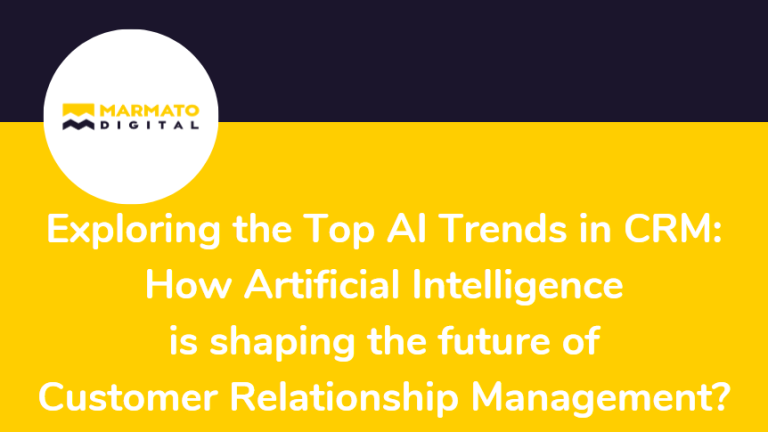Artificial intelligence is no longer a futuristic concept but a present-day reality in Customer Relationship Management (CRM). AI trends in CRM are vast and impactful. As we delve deeper into the AI trends in CRM, it becomes clear that embracing these technological advancements is essential for staying competitive in today’s fast-paced business landscape. Stay tuned as we explore the latest trends and innovations shaping the future of AI in CRM.

Understanding the Integration of AI and CRM:
Artificial Intelligence is revolutionizing the way businesses manage their customer relationships. By integrating artificial intelligence into Customer Relationship Management (CRM) systems, companies can gain valuable insights, improve efficiency, and deliver personalized customer experiences.
AI-powered tools can analyze customer data to predict buying behaviors, automate routine tasks, personalize marketing campaigns, and provide real-time support through chatbots.
The impact of AI on CRM is profound. It enables businesses to streamline processes, enhance customer satisfaction, and drive revenue growth by leveraging data-driven insights and automation capabilities.
Exploring AI trends in CRM:
1. Personalization at Scale:
Personalization has become a key focus in customer experience, and AI plays a pivotal role in transforming how businesses engage with their customers. One of the most significant advantages of using Artificial Intelligence for personalization is the ability to create targeted and relevant marketing campaigns. Moreover, by analyzing vast amounts of data, AI algorithms can identify patterns and trends that enable businesses to deliver personalized messages that resonate with each customer on a more profound level.
Common Challenges and Solutions:
I. Data Quality and Quantity:
Challenge
Obtaining comprehensive and accurate data for personalization can be challenging due to data silos, inconsistencies, and incomplete information.
Solution
Unified Data Platform – Implement a centralized data platform to aggregate and harmonize customer data from various sources, ensuring data consistency and quality.
II. Privacy Compliance:
Challenge
Balancing the need for personalization with data privacy regulations and customer consent requirements poses a significant challenge.
Solution
Privacy by Design – Adopt privacy-preserving techniques such as anonymization, encryption, and user consent mechanisms to protect customer privacy while enabling effective personalization.
III. Scalability:
Challenge
Maintaining real-time personalization becomes increasingly complex and resource intensive as the customer base grows.
Solution
Scalable Infrastructure – Invest in scalable AI infrastructure and cloud computing resources to handle large volumes of data and ensure real-time processing of personalized recommendations.
IV. Algorithm Bias:
Challenge
AI algorithms may introduce biases based on the data they are trained on, leading to inaccurate or unfair personalization recommendations.
Solutions
Algorithm Transparency and Fairness – Regularly evaluate AI algorithms for biases and fairness, incorporating diverse training data and implementing fairness-aware algorithms to mitigate biases.
2. Predictive Analytics:
By leveraging predictive analytics in CRM (Customer Relationship Management), businesses can forecast sales more accurately and make informed decisions based on data-driven insights. In addition, by leveraging machine learning algorithms, CRM systems can predict future customer behaviors, aiding businesses in strategic decision-making and proactive engagement.
Common Challenges and Solutions:
I. Data Quality and Availability:
Challenge
Incomplete or outdated data can lead to inaccurate predictions, while limited data availability may hinder the development of robust predictive models.
Solution
Data Quality Assurance – Implement data quality checks and cleansing processes to ensure data accuracy and completeness before training predictive models.
II. Model Interpretability:
Challenge
Complex machine learning models may lack transparency, making it difficult for users to understand how predictions are generated and trust the results.
Solution
Interpretability Techniques – Utilize interpretable machine learning models or post-hoc interpretability methods to explain model predictions and enhance user trust.
III. Overfitting and Generalization:
Challenge
Overfitting occurs when a model performs well on training data but fails to generalize to unseen data, leading to unreliable predictions in real-world scenarios.
Solution
Regular Model Evaluation – Continuously evaluate predictive models on unseen data to assess generalization performance and detect potential overfitting.
IV. Ethical Concerns:
Challenge
Predictive analytics raises ethical concerns regarding data privacy, fairness, and potential biases in decision-making processes.
Solution
Ethical Guidelines and Audits – Establish ethical guidelines for predictive analytics and conduct regular audits to identify and mitigate biases in predictive models.
3. Conversational AI:
AI-powered chatbots and virtual assistants enhance customer interactions by providing real-time support, streamlining communication channels, and resolving queries efficiently. However, these chatbots can handle various tasks, from answering frequently asked questions to processing simple transactions, freeing up human agents to focus on more complex issues.
Common Challenges and Solutions:
I. Natural Language Understanding:
Challenge
Understanding the nuances of human language, including slang, context, and variations, poses a challenge for conversational AI systems.
Solution
Advanced NLP Techniques – Utilize advanced natural language processing (NLP) techniques, such as pre-trained language models and sentiment analysis, to improve understanding of user input.
II. Contextual Understanding:
Challenge
Maintaining context over extended conversations and understanding user intents across multiple turns can be difficult.
Solution
Context Management – Implement context management strategies, such as dialogue state tracking and memory mechanisms, to maintain context and continuity in conversations.
III. Personalization:
Challenge
Providing personalized responses relevant to each user’s preferences and history requires access to comprehensive user profiles and real-time data.
Solution
Personalization Engines – Integrate conversational AI systems with CRM platforms to access customer data and personalize responses based on user preferences and history.
IV. Integration with Backend Systems:
Challenge
Integrating conversational AI systems with backend CRM systems and databases to access relevant information and provide accurate responses in real time.
Solution
API Integration – Develop APIs and connectors to seamlessly integrate conversational AI systems with backend CRM systems, enabling access to real-time data and providing accurate responses.
4. Automated Workflows:
AI automates repetitive tasks such as data entry, lead prioritization, and email responses, freeing human resources to focus on high-value activities. This not only saves time but also ensures accuracy and efficiency in handling information. By analyzing various parameters and behaviors, AI can help businesses identify high-potential leads, allowing sales teams to focus on leads most likely to convert. In addition, this targeted approach not only increases conversion rates but also optimizes resource allocation.
Common Challenges and Solutions:
I. Process Complexity:
Challenge
Identifying and automating complex business processes with multiple decision points and dependencies can be challenging.
Solution
Process Mapping and Simplification – Analyze and streamline existing processes before automation to eliminate inefficiencies and reduce complexity.
II. Legacy Systems Integration:
Challenge
Integrating AI-driven automation solutions with legacy systems and workflows may require significant technical expertise and customization.
Solution
API-Based Integration – Develop APIs and integration frameworks to connect AI-driven automation solutions with legacy systems, enabling seamless data exchange and workflow automation.
III. Human-Machine Collaboration:
Challenge
Ensuring smooth collaboration between automated AI systems and human workers, especially in cases where human judgment or intervention is required.
Solution
Human-in-the-loop Automation – Implement human-in-the-loop automation workflows where human judgment is required for decision-making or validation, ensuring accuracy and reliability.
IV. Change Management:
Challenge
Overcoming resistance to change and gaining buy-in from employees for adopting AI-driven automation solutions.
Solution
Training and Communication – Provide comprehensive training programs and clear communication to employees about the benefits of AI-driven automation and how it will enhance their work processes.
Conclusion:
In conclusion, by harnessing the power of intelligent automation and insights from artificial intelligence trends, businesses can unlock new opportunities for growth, innovation, and success in the ever-evolving world of CRM. Most importantly, the future is bright for those willing to adapt and leverage these cutting-edge technologies to create meaningful customer connections.
Change your CRM plan and make the most of AI-powered personalization!
Are you ready to revolutionize your Customer Relationship Management (CRM) strategy and unlock the full potential of AI-driven personalization? Look no further than Marmato Digital, your trusted partner in marketing automation. Our expert team specializes in implementing cutting-edge AI trends in CRM to maximize your ROI and impact. Our tailored solutions are designed to optimize your CRM system, drive engagement, and boost sales.
Don’t miss out on the opportunity to stay ahead of the curve in today’s competitive market. Contact Us now to embark on your journey towards AI-powered CRM success. Let’s elevate your customer relationships and transform your business outcomes together.
Subscribe to Newsletter
Get our latest blogs directly to your inbox.

